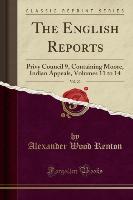- Start
- The English Reports, Vol. 20
The English Reports, Vol. 20
Angebote / Angebote:
Excerpt from The English Reports, Vol. 20: Privy Council 9, Containing Moore, Indian Appeals, Volumes 11 to 14
This is an application for permission to appeal to the Privy Council against the Order of the High Court passed in the execution of a decree of the Privy Council. Notice was ordered to be issued to the opposite party to come in and show cause against this application within one month from the date of service of notice. Subsequently, both parties having appeared, and as the case involved a new point of considerable importance, it was ordered on the 26th August, 1865, to be brought-up before the miscellaneous Bench of Judges. It accordingly came before the Court (present, Justices Loch and Glover) on the 13th September, 1865. Mr. Justice Loch delivered judgment and an Order was passed by this Court on the 27th April, 1865, confirming an Order passed by the Principal Sudder Ameen in execution of a decree for a sum above Rs. And application is now made to the Court for permission to appeal to the Privy Council under section 39 of the Charter of the High Court. The words of the Charter quoted in support of the application are from any final judgment, decree, or Order of the said High Court made in appeal. The words, no doubt, are very wide: we think that they are not intended to extend the privilege of appealing to the Privy Council in miscellaneous cases, or to alter the present rules which restrict an appeal to 'judgments, decrees, or decretal Orders.' In Regulation XVI. Of 1797, the word judgment was alone used, but, notwithstanding, parties had been allowed to send miscellaneous cases to the Privy Council: the practice was put a stop to in 1837 by a construction of the late Sudder Court, dated the 18th August, 1837, No. 1102. In 1838 an Order in Council was passed, bearing date the l0th April, issuing rules for the admission of appeals to the Privy Council, and in the first of these rules we have the words judgment, decree, or decretal order, ' all of which words, we think, are intended to have one and the same meaning, viz., the judgment or decisions come to in a suit, ' and that they do not refer to Orders passed in execution of a decree. Such has been the interpretation put upon the words by the public, for up to the present time no application has been made to submit miscellaneous appeals to the Privy Council through this Court Since the rules of 1838 were promulgated. In the Charter of the High Court the same words are used, with the omission of the word decretal before Order no doubt it is a remarkable omission, but reading it with the assistance we have from the letter of the Secretary of State for India, of the 14th May, 1862, par. 37, we do not think that so material a change in the past practice of the Courts as the permission to appeal from miscellaneous Orders would have been passed by without comment, when he notices very particularly the introduction of a section in the Charter allowing of appeals from interlocutory Orders with the permis sion of a Judge of the High Court. In the paragraph of the letter referred to it is distinctly stated, that in regard to appeals to the Privy Council the object has' been to avoid unnecessary innovation, that the existing rules which regulate theme appeals are, therefore, left in force, with one or two additions only, and the writer proceeds to instance the introduction of a section permitting appeals from interlocutory Orders: and we think that there is a very great and sufficient reason why an appeal from Orders passed in execution of a decree should not be allowed, which is, that if allowed it would open a fresh door for harassing an Opponent who has already had to fight his battle perhaps up to the Privy Council, and deprive him of the power of executing his decree without further trouble and vexation. We think, therefore, that this and such like appeals cannot. Be received. And we reject the application.
Folgt in ca. 5 Arbeitstagen
